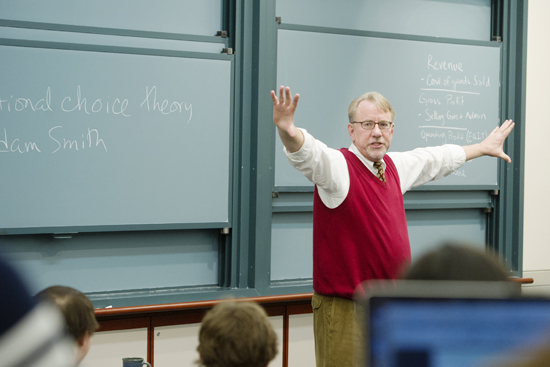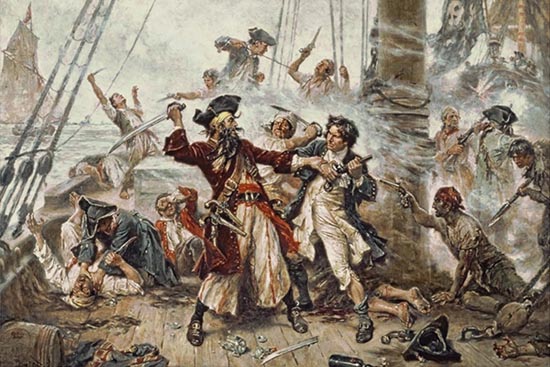Planting the Jolly Roger in a Classroom
BU course ponders piracy—yes, the Johnny Depp kind

Historian Clifford Backman’s class The History of Piracy surveys buccaneers of yore, and in our own time. Photo by Jackie Ricciardi
Class by class, lecture by lecture, question asked by question answered, an education is built. This is one of a series of visits to one class, on one day, in search of those building blocks at BU.
Clifford Backman hardly looks like a pirate in his red sweater vest, tie, and rolled-up sleeves—not even an eyepatch in sight. Yet this affable College of Arts & Sciences scholar is addressing a lecture hall full of students about the maritime marauders of the 17th century. More than that, he’s using autobiographical nuggets to help illuminate the topic.
Pirates, the reading assignment for today’s class contends, were merely capitalist entrepreneurs, acting as we all do out of rational, economic self-interest. Backman, an associate professor of history, isn’t buying that theory. Humans don’t necessarily make rational choices, he says, citing how he chose a college solely because his girlfriend went there, only to lose her to a Minneapolis newscaster. The irrationality of following her struck Backman when he browsed a local electronics store, where “the son of a bitch was on all 65 televisions.”
Don’t believe everything you read is one valuable lesson offered in Backman’s The History of Piracy. For the record, he’s heard his fill of arrrhh maties from students who’ve taken his course, and yes, several donned pirate costumes for the first class this semester. But Backman, a specialist in late medieval Mediterranean society, says there’s academic oomph to this topic, movies and Treasure Island knockoffs notwithstanding. He does devote the last class to modern, digital piracy, “simply because the students have asked.”

“Piracy is as old as commerce,” he says, and today it’s big commerce—$16 billion a year, primarily in the Indian Ocean and the China Sea. It’s also newsworthy, as the occasional story on Somali pirate kidnappings attests. (A Vanity Fair headline about that topic in 2009 proclaimed “a new age of piracy.”) Long John Silver’s real-life counterparts also can claim a role in spurring several historic developments, such as the rise of the British Empire’s naval superiority. Pirates supported by the British government, such as Sir Francis Drake, “would simply mug the Spanish on their way back” with gold from the New World, learning maritime skills in the process, Backman says.
Open to all undergraduates, the course was first offered last fall after the history department chair, facing a drop in history enrollments, “asked me to come up with a sexy new course. I offered him four or five. And he said, ‘Go with pirates.’”
Good call: Backman had to raise the class cap several times to accommodate the 101 students who signed up this semester. (He’ll teach it again in the fall.) Clearly, the topic appeals to a generation reared on Johnny Depp’s Pirates of the Caribbean franchise.
School of Management students comprise a third of the class, making this day’s economics-argued reading especially relevant. Backman’s skepticism about the author’s argument that capitalism and rational choice best explain piracy doesn’t merely reflect his wandering in electronics stores. From Moses Henriques, who plundered gold-laden Spanish ships in the 1600s to avenge Jewish victims of the Inquisition, to escaped African slaves with no other way to survive in the Caribbean, pirates often had motives other than rational profit-seeking—and anyway, profits were hardly guaranteed in this line of work, the professor says. (The following week’s reading would treat piracy from a Marxist perspective, he alerts the class.)

That state-sanctioned pirates were tools used by nations against rivals has been the most startling revelation for history major Allison Guarino (CAS’16). “Piracy wasn’t just necessarily for people who were the outcasts of society,” she says after class. “Nobility was actually interested in becoming part of the piracy.”
Backman believes our piracy obsession reflects a cultural appreciation for outlaws, a release valve from the regimented 9-to-5 structure of daily life. Yet he hopes to impart one big lesson: “Piracy is not cool.” The syllabus announces his view, promising that one class theme will ask, why “do we delight in the adventures of these particular murderers and thugs?”
The other thing he hopes to teach students is that “piracy is a constant in human history. It’s as prevalent today as it ever was,” probably because globalization has boosted maritime trade and the opportunities for theft on the high seas. Also, it’s surprisingly easy to stop a ship with just a small boat, a grenade launcher, and a few pirates. About two years ago, Somali pirates stopped and boarded what they thought was a merchant ship. “It was actually a military ship that belonged to Holland,” says Backman. The startled pirates did a 180 and fled—but had proved that even an armed cruiser can be brought to a standstill.
This Series
Also in
One Class, One Day
-
November 30, 2018
Breaking Bad Director Gives CAS Class the Inside Dope
-
October 31, 2018
Trump and the Press: We’ve Been Here Before
-
August 3, 2018
A Scholarly Take on Superheroes


Comments & Discussion
Boston University moderates comments to facilitate an informed, substantive, civil conversation. Abusive, profane, self-promotional, misleading, incoherent or off-topic comments will be rejected. Moderators are staffed during regular business hours (EST) and can only accept comments written in English. Statistics or facts must include a citation or a link to the citation.